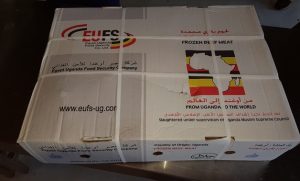Uganda completes debut beef export to Egypt
July 31, 2018 – After two years in development, Luwero based beef processor, Egypt-Uganda Food Security Company (EUFS) has made the first 50-ton shipment of Ugandan beef to Egypt, Chief Executive Officer, Sherif el-Kallini, told Egyptian media in Cairo Saturday.
The online publication Egypt Today quotes Kallini as saying that Ugandan meat was of higher quality than the Brazilian meat that Egypt has been relying on.
The shipment is the culmination of three memoranda of understanding that President Museveni signed with his Egyptian counterpart President Abdel Fatah al-Sisi during a visit to Cairo in May.
The presidents witnessed the signing of three MoUs in the fields of electricity, agriculture development and industrial zones. Museveni then said that both leaders were keen to support the establishment of mutual projects aimed at realizing food security for both peoples.
Museveni pointed out that Uganda produces the finest beef, originating from organically fed livestock.
President Museveni inaugurated the Egypt-Uganda Food Security Company meat processing facility in Luwero in 2016. EUFS is considered Africa’s largest slaughterhouse.
Museveni’s two-day visit in May was at the invitation of President Sisi during which they discussed ways to enhance bilateral relations, as part of Egypt’s efforts to broaden cooperation with sub-Saharan countries in different fields.
Egypt-Uganda trade increased 27 percent year-on-year to reach $66 million in 2017, according to Sherine el-Shorbagy the head of Egypt’s Export Development Authority (EDA).
In remarks to the press Minister of Foreign Affairs Sameh Shoukry said that the Egyptian private sector was willing to scale up its investments in Uganda.
He referred to an Egyptian company that is conducting a feasibility study to establish projects worth an estimated at $300 million, in the fields of electricity and energy.
In 1996, Egypt which as at the time importing food items worth $3 billion annually, offered to import atleast half a billion dollars worth of its food needs from sub-Saharan Africa but there has been little progress since then.


 African Heads of state head to South Korea next week for Summit talks
African Heads of state head to South Korea next week for Summit talks
 Trading leads as main source of income for Ugandans
Trading leads as main source of income for Ugandans
 New leadership for bankers’ umbrella as total assets top $12 billion
New leadership for bankers’ umbrella as total assets top $12 billion
 Brussels Airlines to announce Nairobi service
Brussels Airlines to announce Nairobi service
 SITA promises enhanced travel experience after Materna acquisition
SITA promises enhanced travel experience after Materna acquisition
 Saudia’s 105 aircraft order stretches A320neo lead over rival Max
Saudia’s 105 aircraft order stretches A320neo lead over rival Max
